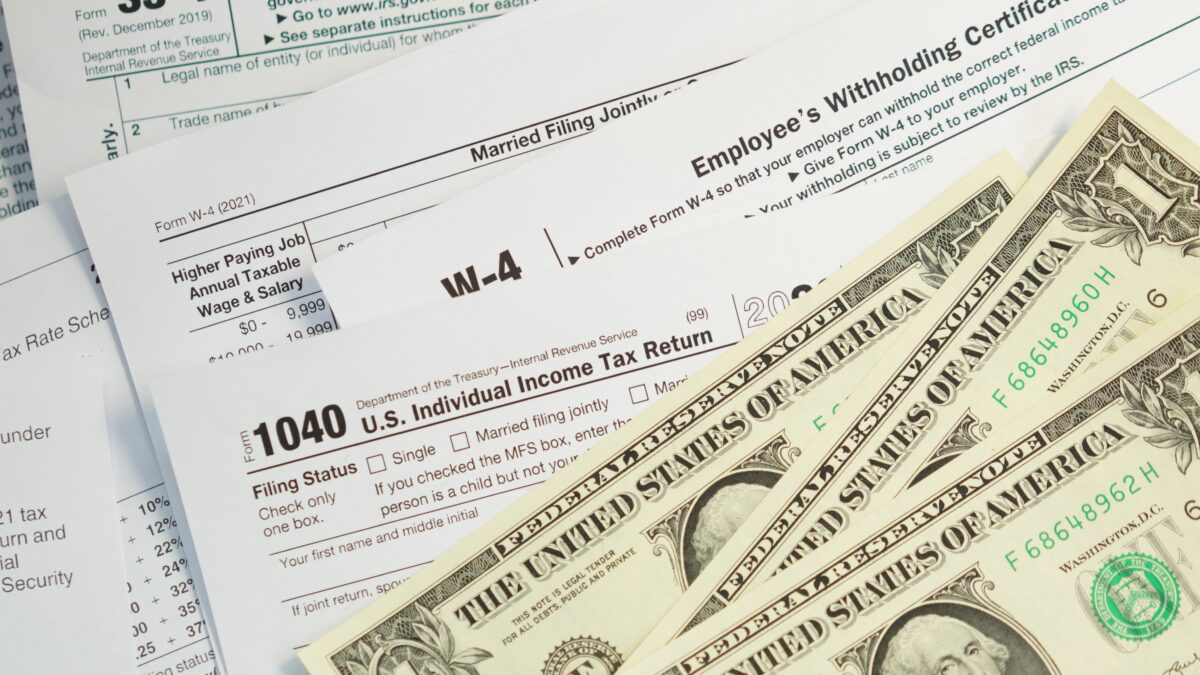
Investing for Beginners
April 24, 2025
How Much Should I Save vs. Invest?
April 24, 2025
What Are the Tax Implications of Investing?
Question: I’m starting to invest for the first time, and I keep hearing people talk about taxes on investing… What do I need to know about paying taxes if I invest in the stock market and make money?
Answer: Many first-time investors want to know: Do I have to pay taxes on the money I earn from stocks? The short answer is usually yes — but how much and when depends on how you’re making money from your investments. Understanding the tax implications of investing can help you make smarter decisions and potentially lower the amount you owe.
There are two primary ways you can earn money from investments: capital gains and income, and both come with tax responsibilities.
Capital Gains: Timing Matters
Let’s start with capital gains. When you sell an investment for more than you paid for it, the difference is your capital gain. But you won’t owe taxes on that gain until you actually sell your investment — this is what’s called a “realized” gain. If your investment has increased in value but you’re still holding it, your gain is “unrealized,” and not subject to tax yet.
Capital gains are taxed differently depending on how long you’ve held the investment before selling:
- Short-term capital gains apply if you held the investment for one year or less. These are taxed at your ordinary income tax rate, which could range from 10% to 37% depending on your income.
- Long-term capital gains apply if you held the investment for more than one year. These are taxed at a lower rate — 0%, 15%, or 20%, depending on your income bracket.
For example, say you bought shares of a tech company in February and sold them in July for a profit. That’s a short-term capital gain, and you’ll pay taxes at your full income tax rate. But if you had waited until the following February to sell — crossing that one-year mark — you would benefit from the lower long-term rate.
Capital losses are the opposite of capital gains. When you sell an investment for less than you paid for it, the difference is a capital loss. And just as with gains, the type of loss — short-term or long-term — depends on how long you held the investment. Capital losses can be used to save you taxes on capital gains. You can write them off against each other, dollar for dollar, as long as they are the same type of gain. For example, if you had $1,000 in long-term capital gains and $1,000 in long-term capital losses, they would wash each other out and you would owe zero in taxes. If you have more losses than gains, you can save them (or “carry them forward”) to use against gains in another tax year.
Dividends and Interest: Income You Can’t Ignore
You can also earn income while you hold certain investments — primarily in the form of dividends (from stocks) and interest (from bonds or savings).
Dividends are distributions of a company’s profits to shareholders. Not all companies pay dividends — many fast-growing companies prefer to reinvest profits into growing their businesses instead. But if you own stock in a company that does pay dividends, you’ll receive a payout, usually quarterly.
Dividends fall into two categories:
- Qualified dividends are taxed at the long-term capital gains rate (0%, 15%, or 20%) — much more favorable than ordinary income rates.
- Ordinary (or nonqualified) dividends are taxed at your regular income tax rate.
To be “qualified,” dividends must meet specific criteria laid out by the IRS — typically, the stock must be held for a certain period of time, and the company must be based in the U.S. or a qualified foreign country.
Meanwhile, interest income, such as what you earn from bonds, savings accounts, or certificates of deposit (CDs), is generally taxed at your ordinary income rate. One exception is municipal bond interest, which is often exempt from federal taxes — and sometimes state and local income taxes.
Retirement Accounts: Tax-Advantaged Investment Options
One of the smartest ways to invest while minimizing your tax liability is to keep your money in a tax-advantaged retirement account, like a 401(k) or IRA (Individual Retirement Account).For both, your accounts can be traditional or Roth.
- With a traditional 401(k) or traditional IRA, you contribute pre-tax dollars, meaning you lower your taxable income in the year you contribute. The money grows tax-deferred, and you’ll pay taxes on withdrawals in retirement at your ordinary income rate.
- With a Roth 401(k) or Roth IRA, you contribute after-tax dollars, but your investments grow tax-free and qualified withdrawals in retirement are also tax-free.
Just keep in mind that these accounts should stay earmarked for retirement: If you withdraw money from a retirement account before age 59½, you may owe taxes plus a 10% early withdrawal penalty (with a few exceptions, such as for qualified education or first-time homebuyer expenses with a Roth IRA).
Reporting Investment Income: 1099 Forms
As an investor, each year, you’ll get certain 1099s from your investment firm that summarizes what you earned.
- 1099-DIV for dividends
- 1099-INT for interest income
- 1099-B if you make a profit when you sell stock
You’ll use these forms to fill out your tax return. Just make sure to review these forms carefully — errors can lead to underreporting income, which can raise red flags with the IRS.
Final Thoughts: Don’t Let Taxes Hold You Back From Growing Your Money
When you invest, you’re giving your money a chance to grow — and paying a little in taxes just means you’re making a profit (which is a very good thing!). Don’t let the thought of taxes scare you away from building your future. Taxes are simply part of the deal, and thankfully smart planning can help you hang onto more of what you earn — so you can keep your money working for you.



